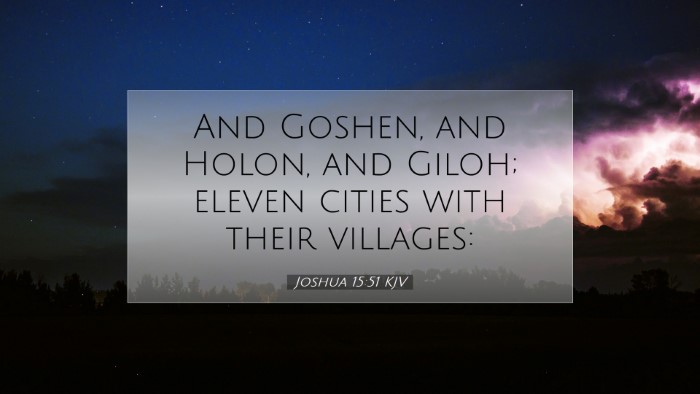Commentary on Joshua 15:51
Joshua 15:51 states: "Gilead, the city of the palaces, which was in the tribe of the children of Judah, and the city of Hebron, which was named after the father of Caleb, were significant cultural and historical centers." This verse plays a crucial role in understanding the territorial allocations of the Israelite tribes in the Promised Land. Below, we offer a synthesis of insights from various public domain commentaries.
Historical Context
Matthew Henry notes that the listing of cities in this chapter serves not only as a record of the divisions of land but also reflects God’s faithfulness to His promises made to the patriarchs. The cities mentioned are important for their historical and spiritual significance in the life of Israel.
Key Locations
- Gilead: Often associated with a land of refuge and healing, Gilead is mentioned several times in the Bible. Its name translates to "a heap of witness" and it symbolizes both the covenantal faithfulness of God and human struggles.
- Hebron: Known as the city of David, Hebron has deep roots in biblical history. It was here that Abraham settled and where the patriarchs were buried. The prominence of Hebron in Joshua 15:51 emphasizes the central role of family and heritage in Israel's identity.
Theological Significance
Albert Barnes emphasizes that the mention of these cities highlights God’s providential care for His people. The cities served as vital centers for worship and community life. This passage is not merely a logistical account of land distribution; it reveals God’s intention for His people to dwell together in unity and heritage.
Divine Providence
This allocation of cities reflects meticulous planning in the face of chaotic circumstances. Adam Clarke suggests that God’s provision was essential for the Israelites, as it allowed them to live in areas of strategic importance, facilitating their community and religious practices.
Spiritual Reflections
The distribution of these cities serves as a reminder for contemporary believers of the importance of place and identity in spiritual life. The significance of location underscores the idea that we are called to be rooted in community under God's sovereign will.
Community and Identity
Matthew Henry highlights that the cities were not just geographical markers but central to the communal life among the Israelites. The locations fostered a sense of belonging and continuity among the people of God and stressed that individual identity is intertwined with the collective narrative of faith.
Lessons for Today
The exploration of Joshua 15:51 encourages pastoral reflection on the significance of community in the life of the church today. Just as these cities were essential for Israel, the church is called to create spaces where communities can grow in faith and service.
Encouragement for Church Leaders
In light of the insights from Clarke, Barnes, and Henry, church leaders should recognize the impact of their communities in shaping faith. An emphasis on connecting congregational life with rich historical and spiritual roots enhances the worship experience and solidifies a sense of identity in Christ.
Conclusion
Joshua 15:51 encapsulates themes of divine faithfulness, community life, and identity within the broader narrative of Israel. The cities of Gilead and Hebron remind us of our collective journey together in faith, echoing the call to maintain our heritage while remaining faithful to God's ongoing promises in our lives.


